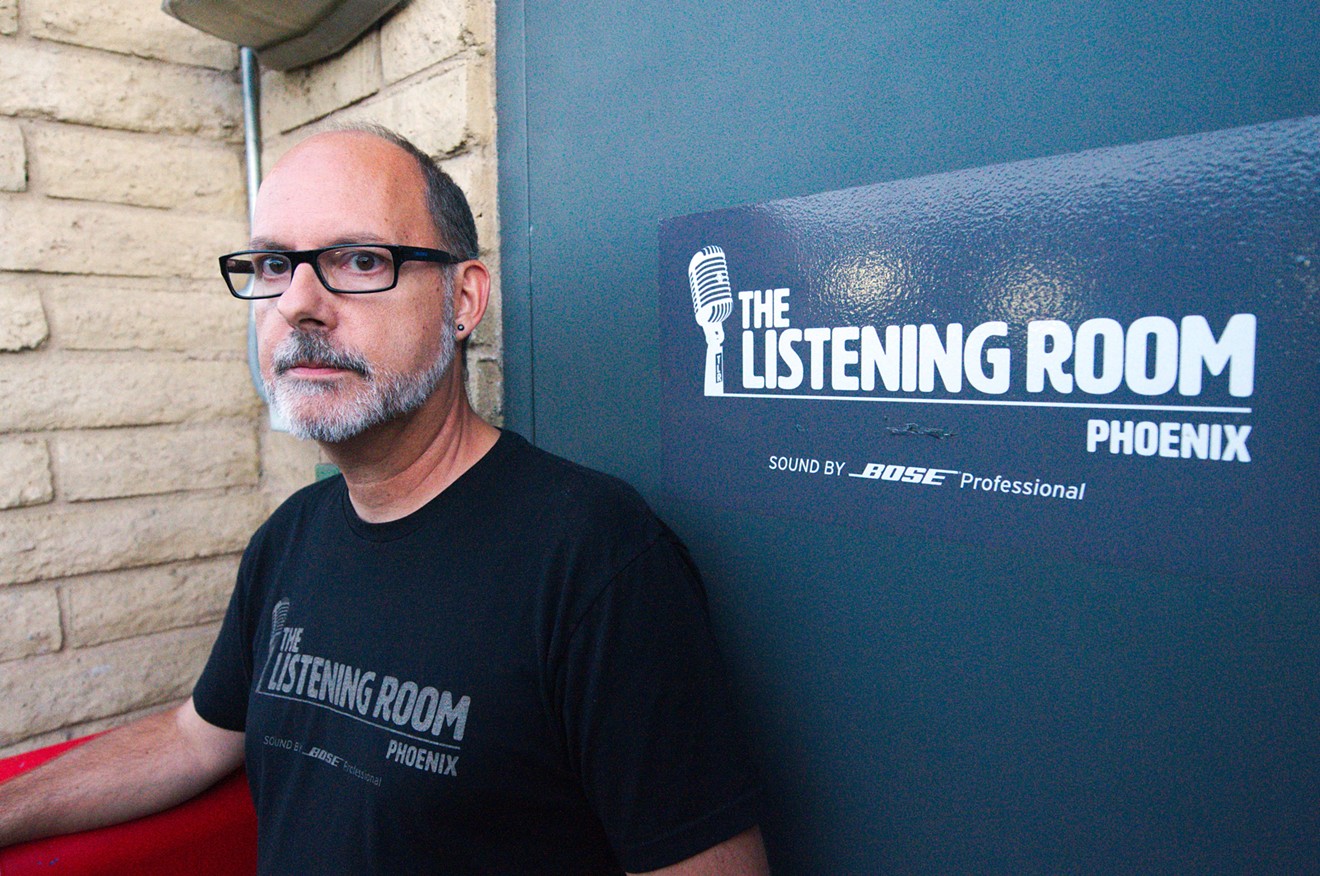UPDATE (6/6/2019 8:40 a.m.): The Listening Room will host one final show this weekend with two sets by vocal trio The Good Feelz on Saturday, June 8. The ensemble will perform a variety of popular and obscure covers.
Co-owner Jim Colletti says it's one last chance to check out the venue. “These are performers who sold out several performances here in the past and couldn't find a venue for this weekend,” he says, “so we’re allowing them to keep the energy going here one last time.”
Performances will be at 6 and 8:30 p.m. Tickets are $20 in advance via thelisteningroomphoenix.com and $25 at the door.
Original Story: There’s no more music to be heard at The Listening Room, just the sounds of silence. The cozy midtown Phoenix music venue, which was located near Seventh Street and Highland Avenue, closed on June 1 after two and a half years in operation.
Fans of the venue, which was beloved by musicians and music lovers alike, were shocked and saddened by the news. Local and touring singer-songwriters enjoyed playing the small-capacity room, while patrons raved about its perfect acoustics and intimate feel.
The Listening Room's owners say the venue was an artistic success, but not a financial one.
“This concept worked and it worked incredibly well,” says co-owner Jim Colletti. “It just wasn’t financially viable.”
The Listening Room opened in November 2016 after Colletti and local musician Adam Smith wanted a performer-focused venue and “pure listening environment” with fantastic acoustics.
The 800-square-foot, 75-person capacity spot was designed "by musicians, for musicians" with a Bose sound system, specialized cameras and mics to record shows, and a designated merch space in the back.
"We saw it as a chance for everyone to get up close with the artists, to create that sort of personal environment … connecting the artist and their music to the audience," Colletti says. "Our goal was to create a space that gave the ultimate to the performer. Every decision we made was around what was best for the performer."
The Listening Room attracted plenty of musicians to its stage. Upward of 300 artists and acts from a variety of genres (from jazz and folk to rock and hip-hop) performed at the venue over two and a half years, including Woodstock legend Melanie Safka and Glee performer Damian McGinty, as well as locals like Daryl Scherer and Dolan Ellis.
Unlike other local venues, The Listening Room didn’t feature a bar or kitchen, as Colletti and Smith felt those diverted the audience’s attention away from the show. (They did allow BYOB, however.) The lack of those money-making amenities contributed to the venue’s demise. Colletti says they’d hoped that ticket sales would’ve compensated for the lack of food and drink sales.
“What was challenging was that, by design, we removed the distractions of a typical performance venue, so there's no food, no beverages, no bar. And those are the revenue generators for most venues, so we were trying to survive solely off of ticket sales,” Colletti says. “And we were at only 75 seats and were just at a point where it was hard to make it work. We just couldn't sustain it with what we had.”
The Listening Room was also a little hard to find. It was tucked away on the ground floor of a small two-story building, which also housed Colletti's marketing and graphic design firm, situated behind an auto repair shop. There also wasn’t any permanent signage on Seventh Street advertising the venue. Colletti thinks both factors worked against them.
“Our location was challenging,” Colletti says. “We were off the beaten path, there wasn’t street signage, [and] we didn't have the opportunity to be seen by 30,000 cars driving by.”
Colletti says there’s the possibility of reopening The Listening Room at a more viable location at some point in the future.
“We're hoping that by taking this moment to take a deep breath and, since summer is traditionally slower anyway, see what can come of this, see if there's an opportunity to reinvent ourselves … maybe in a bigger space, maybe in a space that's in more of an entertainment district or closer proximity to food or beverage,” Colletti says. “That’s what we’re hoping to do, to try to bring the pieces together that we don't currently have.”
Regardless of location, Colletti says, the goal of The Listening Room will remain the same.
“It may be a larger space [or] it may be closer to an entertainment district, but we're going to retain the purity of the space. We believe that's the winner right there.”
[
{
"name": "Air - MediumRectangle - Inline Content - Mobile Display Size",
"component": "18478561",
"insertPoint": "2",
"requiredCountToDisplay": "2"
},{
"name": "Editor Picks",
"component": "16759093",
"insertPoint": "4",
"requiredCountToDisplay": "1"
},{
"name": "Inline Links",
"component": "17980324",
"insertPoint": "8th",
"startingPoint": 8,
"requiredCountToDisplay": "7",
"maxInsertions": 25
},{
"name": "Air - MediumRectangle - Combo - Inline Content",
"component": "16759092",
"insertPoint": "8th",
"startingPoint": 8,
"requiredCountToDisplay": "7",
"maxInsertions": 25
},{
"name": "Inline Links",
"component": "17980324",
"insertPoint": "8th",
"startingPoint": 12,
"requiredCountToDisplay": "11",
"maxInsertions": 24
},{
"name": "Air - Leaderboard Tower - Combo - Inline Content",
"component": "16759094",
"insertPoint": "8th",
"startingPoint": 12,
"requiredCountToDisplay": "11",
"maxInsertions": 24
}
]












